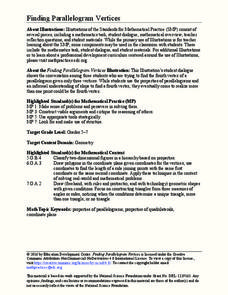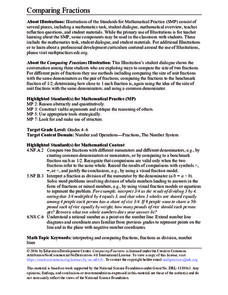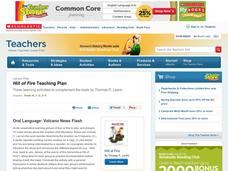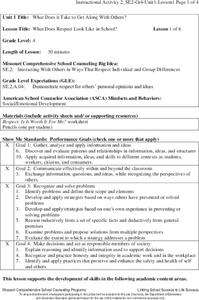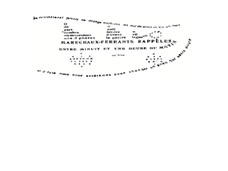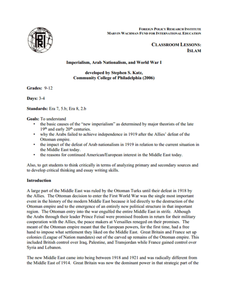Indiana Department of Education
Voting: It's Not a Spectator Sport!
Why is it important to vote? Who is eligible to vote? Why is it that some eligible voters do not vote? Class members conduct interviews with adults and other school mates before researching the eligibility requirements for their state,...
Curated OER
“THE LORAX” by Dr. Seuss
Few children's books convey the message of conservation as well as Dr. Seuss' The Lorax. Read the story aloud, emphasizing the interconnectedness of plants and animals in an ecosystem and discussing different ways people can help the...
Curated OER
Deciphering Word Problems in Order to Write Equations
Help young mathematicians crack the code of word problems with this three-lesson series on problem solving. Walking students step-by-step through the process of identifying key information, creating algebraic equations, and finally...
DiscoverE
Design a Dome
Do domed structures have advantages over their less-than-spherical counterparts? Junior architects explore the pros and cons of domes through a design challenge. Teams work together to plan, sketch, build, and test domes created from an...
Curated OER
Let's Review for Better Achievement
Seventh graders create goals using two or more skills they have identified to help them improve academic achievement. They discuss the question: What choices do you make that affect your grades? Students listen to the story of Sam the...
EngageNY
Writing to Inform: Analyzing a Model Using a Rubric
Learn to write right. Scholars analyze the model essay Adversity Faced by Townspeople in the Middle Ages. They discuss the essay and make annotations working with an elbow partner. Learners then take another look at the essay using a...
Education Development Center
Finding Parallelogram Vertices
Four is the perfect number—if you're talking about parallelograms. Scholars determine a possible fourth vertex of a parallelogram in the coordinate plane given the coordinates of three vertices. They read a conversation...
Education Development Center
Comparing Fractions
Three heads are better than one. After reading a conversation between three friends about how to compare fractions, scholars analyze and discuss each presented strategy. These include using unit fractions, using benchmark fractions,...
Scholastic
Hill of Fire Teaching Plan
Some books are perfect for drawing connections between multiple subjects. The book Hill of Fire becomes the hub for three very different, yet related activity ideas. First the class hones their oral language skills by creating an...
Missouri Department of Elementary
What Does Respect Look Like in School?
What does it mean to be respectful? Scholars complete a self-assessment worksheet to determine just how respectful they are. Next, they choose three items from the survey and write plans for how to improve in those areas.
Missouri Department of Elementary
Tic Tac Toe, Get Off My Toes
Why is conflict resolution such an important skill to learn? Pupils explore the topic, playing an adapted Tic-tac-toe game. Two class teams are tasked with finding a win-win solution to a hypothetical conflict before adding their X or O...
Curated OER
Picture Perfect Poetry
Do your language arts students love to draw? Use this lesson to reinforce poetic techniques with illustration. After drawing what they think poem would look like with no words, middle and high schoolers work on several different...
Curated OER
The Design of Fort McHenry: The Star Fort
What makes an effective fort, and why might a city feel that they need such a structure? Your young historians will explore the purpose and design for Fort McHenry, and build their own models of a fort based on the information they have...
Reed Novel Studies
The Wednesday Wars: Novel Study
Teacher's pet or enemy? Holling, a character in The Wednesday Wars, feels his teacher is out to get him. However, he has to remain on his best behavior to ensure his father's business does not suffer. How will he ever survive 7th grade?...
Curated OER
The Trial of the Bloody Sucker
A blood sucking what? Grade schoolers identify the characteristics of blood sucking parasites. They organize their information, identify their arguments, and present them to the class in persuasive arguments. They participate in a debate...
Foreign Policy Research Institute
Imperialism, Arab Nationalism and World War I
Continued conflict in the Middle East makes this lesson relevant, and the inclusion of a critique of Lawrence of Arabia might increase student interest in a potentially challenging topic. The resource includes a solid introduction to the...
Read4Health
Piggybook: A Read4Health Lesson Plan
"You are pigs." With those three simple words, the lives of the Piggott family were changed forever. Read aloud the children's story Piggybook by Anthony Browne and teach your class the importance of personal responsibility, learning...
DiscoverE
Working with Watermills
Water is a powerful force; harness it through watermills. The task at hand is to create a simple watermill that functions in flowing water for at least three minutes. Scholars work together in teams to design and construct such a...
Reed Novel Studies
We All Fall Down: Novel Study
Where were you when the world stopped turning that September day? Will, a ninth grade student in We All Fall Down, was at work with his father in the World Trade Center. Scholars read Will's story of the accounts told in first person....
Skyscraper Museum
Changes in a City Over Time
Investigate the growth and development of New York City with the final lesson in this four-part series on skyscrapers. Learners first explore the concept of urban growth by looking closely at a series of three paintings made of Wall...
NASA
Is It Alive?
Determining whether or not something is living can be more difficult than it seems. Put your young scientists to work defining their own criteria to identify life, then work with three samples to see if they are alive or not.
PBS
Reading Adventure Pack: Building
Scholars become architects in an engaging unit on building structures. The Reading Adventure Pack features Roberto: The Insect Architect by Nina Laden and Construction Zone with photographs by Richard Sobol and text by Cheryl Willis...
Curated OER
Editing Marks, Part 1
Dander from the show Twisted Whiskers and characters from My Little Pony are featured in this three part lesson that explores using story pyramids to scaffold ideas, adding sensory details to enrich writing, and editing using common...
Curated OER
What Are the Advantages and Disadvantages of Conforming?
Dive into Arthur Miller’s The Crucible and determine what it means to conform in society, and discuss as a group with the thoughts and plans available in these documents. Included are multiple activities and brain targets that form the...








